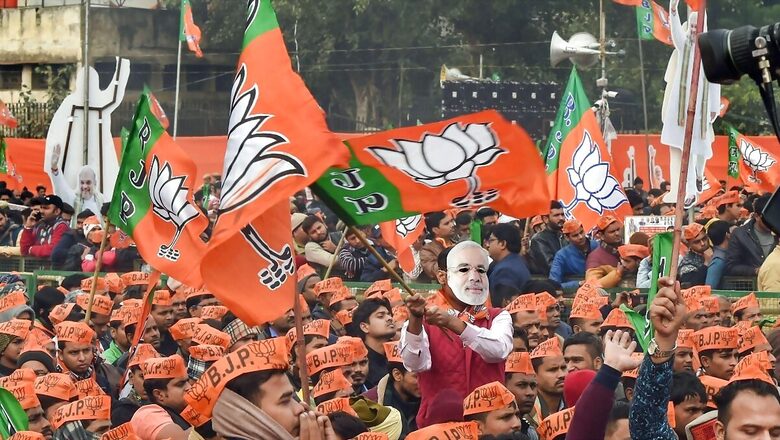
views
The emergence of digital media—social media, mobile journalism, YouTube, etc—has transformed the political contour in India, with social media platforms becoming the new battleground for electoral campaigns. This tectonic shift has been particularly evident in the period post-2014, as political parties have adapted their strategies to capitalise on the growing influence of digital platforms. Among these parties, the Bharatiya Janata Party (BJP) has proven to be the most successful in harnessing the power of social media to connect with voters and shape public opinion, while the Congress-led Opposition—if one may say so—has retained its spot in setting the narratives and discourse, even at the cost of peddling fake news and running disinformation campaigns.
Political parties have invested heavily in building a robust social media presence, with dedicated teams working to create and disseminate content across platforms like Instagram, Facebook, X (formerly Twitter), and WhatsApp. This approach has allowed these parties, especially the trailblazer BJP, to bypass traditional media channels and directly engage with voters, particularly the younger, tech-savvy demographic. This may have left the so-called mainstream out of the stream!
Central to the BJP’s digital dominance has been the leadership of Prime Minister Narendra Modi. His personal brand and massive social media following have been instrumental in driving the party’s online narrative. His direct communication style and ability to connect with voters through platforms like X, have set him apart from other political leaders and helped establish a sense of trust and authenticity.
The Modi-led BJP has also been effective in leveraging data analytics and targeted advertising to reach specific voter segments. By observing social media trends and user behaviour patterns, the party has been able to tailor its messaging and outreach to resonate with different constituencies. This data-driven approach has given the BJP a significant advantage in mobilising supporters and swaying undecided voters.
While the BJP has set the standard for digital campaigning in India, many parties, from regional to national, have also recognised the importance of adapting to the new media landscape. The Indian National Congress, the main Opposition party, now in a feeble and faltering state, has made efforts to strengthen its social media presence and engage with voters online. However, the party has struggled to match the BJP’s coherence and effectiveness in its digital strategy. Regional parties have also embraced digital media to varying degrees, using platforms like Facebook and WhatsApp to connect with local constituencies and amplify their messages. These parties have often focused on issues specific to their regions, and they have used social media to mobilise support and challenge the national narrative.
The rise of digital media in Indian politics has not been without its challenges and concerns. The spread of misinformation and fake news on social media platforms has become a major issue, with political parties and their supporters often accused of propagating false or misleading content to influence public opinion.
Do you recall the case where the former national spokesperson endured harassment until her disappearance from public life? It was initiated by a doctored video shared by Mohammad Zubair, a figure known for provocative rhetoric and a history of stirring tensions. That rebel rousing led to the loss of at least six innocent Hindu lives at the hands of rabid and fundamentalist Islamists.
The use of social media for political propaganda and the targeting of specific voter groups have also raised questions about the fairness and transparency of digital campaigns. The lack of effective regulation and the opacity of online advertising has made it difficult to hold parties accountable for their digital activities. There was this infamous case of Cambridge Analytica, a data analytics firm, that the Indian National Congress exploited to access the personal information of millions of Facebook users without their consent. Moreover, the increasing polarisation and echo chambers created by social media algorithms have led to concerns about their impact on democratic discourse. Users’ inclination to interact with content that confirms their pre-existing beliefs has hindered the visibility of diverse viewpoints and intensified the political atmosphere.
Digital media will play an increasingly significant role in politics as India prepares for the 2024 elections and beyond. Political parties will continue to refine their digital strategies and invest in new technologies to gain an edge over their competitors. However, it is crucial for all stakeholders—parties, platforms, regulators, and citizens—to work together to address the challenges posed by digital media in politics.
We must make efforts to combat misinformation, enhance transparency in online campaigning, and promote a more inclusive and constructive political discourse. It is time we reclaim our digital space, for we can’t let third-party individuals or agencies run amok out there with a sordid history of spreading disinformation and dog-whistling individuals of a particular ideology averse to theirs in the garb of fact-checking!
The case of Nupur Sharma, former national spokesperson of the BJP, is a classic case in study. The government of the day ought to focus on bolstering its efforts in debunking the misinformation and disinformation campaign matter-of-factly—whether homegrown or a part of the “international toolkit”—with iron first.
The BJP’s digital dominance has set a new standard for electoral campaigns with its intuitive and innovative content and the reach it gets owing to the highest following that the official handles of the party, its leaders and especially PM Modi boast. As India navigates this digital transformation, it is essential to balance the benefits of increased political engagement with the need to safeguard the integrity and fairness of the democratic process. India can ensure that the power of social media enhances democracy rather than undermines it by promoting digital literacy, encouraging responsible online behaviour, and strengthening regulations.
The 2024 elections will be a crucial test for the maturity and resilience of India’s digital political ecosystem. The lessons learned from the past decade will shape the strategies and discourse of the future as parties continue to adapt to the ever-evolving digital landscape. Ultimately, the success of India’s democracy in the digital age will depend on the collective efforts of all stakeholders to harness the potential of social media while mitigating its risks.
Yuvraj Pokharna is an independent journalist and columnist. He tweets with @iyuvrajpokharna. Here’s the link to Yuvraj’s official WhatsApp channel: https://whatsapp.com/channel/0029VaBKt038vd1QvwLPp515. Views expressed in the above piece are personal and solely that of the author. They do not necessarily reflect News18’s views.



















Comments
0 comment